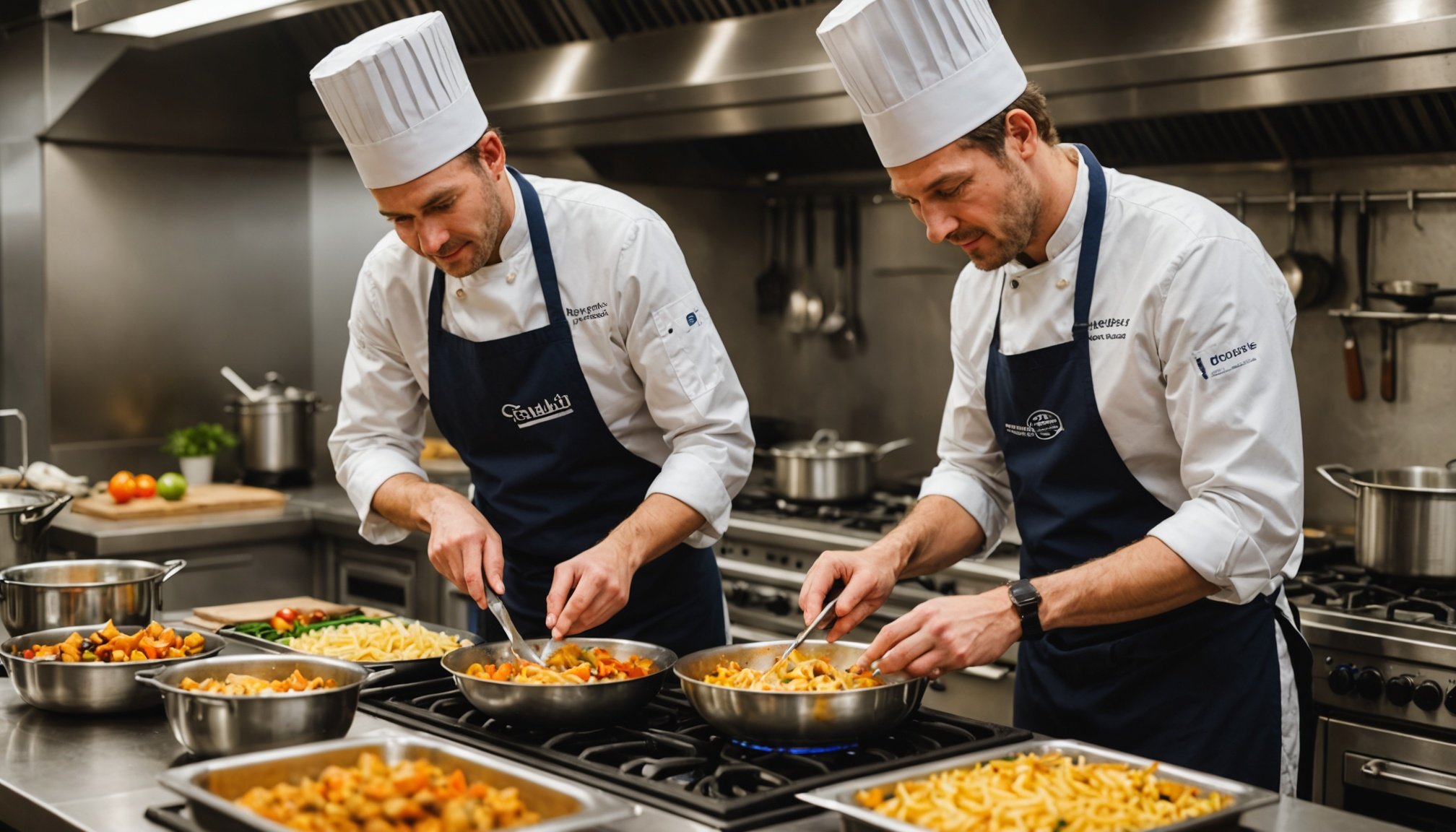Comprehensive Resource Overview
Navigating your journey to master professional cooking skills requires the right resources. Finding cooking courses tailored to your needs in the UK is vital for effective culinary education. Such courses offer structured training that helps improve skill sets, making them essential for both beginners and those looking to refine their techniques.
Consider the range of options available when selecting a program. Look for courses that align with your learning goals, whether it is mastering the fundamentals or advancing specific skillsets. Ensure that the curriculum is comprehensive, covering all key areas of professional cooking. This guarantees the course is not only teaching techniques but also enhancing your understanding of culinary concepts.
Also read : Revolutionary Cooking Tips Redefining the Culinary Landscape
When choosing a course, take into account factors like the experience level the program caters to, testimonials and reviews from past students, and any affiliations with recognized culinary bodies. These elements help validate the quality of the course and provide a more impactful learning experience. Tailored courses in the UK are designed to suit various learners’ needs, so taking the time to assess these factors will ensure optimal progress in developing your professional cooking skills.
Recommended Culinary Schools and Programs
Choosing the right culinary schools and UK cooking programs is pivotal in acquiring professional culinary expertise. The UK is home to several prestigious schools offering professional courses that are respected globally.
Also read : Tasty Recipes for Eco-Friendly Growth: Nourish Your Future
Top Reputable Culinary Schools in the UK
Renowned institutions such as Le Cordon Bleu London and Westminster Kingsway College offer comprehensive courses designed for aspiring chefs. Their professional courses emphasize both practical kitchen skills and theoretical knowledge, ensuring students are industry-ready.
Notable Online Cooking Programs
For those preferring flexible study options, reputable online courses like those from Rouxbe provide an excellent alternative. These programs typically offer in-depth video content and interactive assignments, making them suitable for balancing learning with other commitments.
Comparison of Full-Time vs. Part-Time Courses
Selecting between full-time and part-time courses depends largely on personal circumstances and career objectives. Full-time courses are immersive, allowing for a concentrated focus on skill acquisition, whereas part-time courses offer the advantage of pacing and flexibility. When evaluating these options, consider the curriculum highlights, alumni success stories, and the program’s accreditation to ensure quality education and valuable career outcomes. Your choice should align with your professional aspirations and lifestyle preferences.
Essential Kitchen Tools for Professional Cooking
Entering the world of professional cooking demands a keen understanding of the kitchen tools that are indispensable for success. Equipping yourself with the right professional cooking equipment can transform your culinary practice and efficiency.
Must-Have Kitchen Tools for Chefs
Every chef should possess a trusted set of essentials. These might include a high-quality chef’s knife, a sturdy cutting board, and reliable mixing bowls. Investing in these cooking essentials will lay the foundation for all culinary tasks.
The Role of Technology in Culinary Equipment
Culinary equipment is rapidly evolving, with technology playing a pivotal role. Modern kitchen tools such as induction cooktops or sous-vide machines offer precision and versatility, enhancing the cooking experience. Staying updated on these technological advancements can significantly impact the quality of your dishes.
Best Brands and Purchase Locations
Choosing tools from reputable brands ensures durability and enhanced performance. Brands like Wüsthof and All-Clad are renowned for their reliability. For purchasing, consider specialized retailers or online platforms, where you can explore extensive product ranges and customer reviews. Selecting the right tools not only enhances your cooking ability but also fosters a professional kitchen environment.
Foundational Culinary Skills for Mastery
Developing expertise in the culinary arts requires mastering a variety of culinary techniques. Central to this is honing your knife skills and food preparation techniques. Proficiency in cutting, slicing, and dicing not only improves efficiency but also affects presentation and cooking outcomes. Mastery comes from practice and understanding proper techniques, such as the claw grip for safety and precision.
Cooking methods form another key area, including baking, grilling, and sautéing. Each method requires specific skills, such as temperature control for grilling or technique for even browning. Practicing these methods regularly enhances your adaptability and creativity in the kitchen.
Understanding flavor profiles and seasoning is crucial for creating memorable dishes. Learning to balance different tastes—salty, sweet, bitter, sour, and umami—allows you to craft dishes that delight the palate. Experimentation and sensory awareness are essential, requiring attention to detail and a willingness to test and refine your approach.
It’s important to utilise available resources, like instructional books and online platforms, to refine these skills. Avoid common mistakes, such as inconsistent knife cuts or over-seasoning, by seeking professional guidance and continuous practice. These foundational skills lay the groundwork for mastery in professional cooking.
Career Pathways in Professional Cooking
Embarking on a career in professional cooking offers a variety of exciting opportunities. Diverse culinary careers await ambitious chefs, each path providing unique challenges and rewards. Understanding these roles is crucial for aligning your interests and ambitions.
Various Roles in the Culinary Industry
The culinary industry is vast, featuring roles like executive chefs, pastry chefs, and culinary instructors, each demanding distinct skillsets. Chef opportunities vary from traditional restaurant kitchens to catering, food artistry, and even culinary innovation. Identifying your passion helps in choosing a path that provides both satisfaction and growth potential.
Certifications and Specializations Available
Achieving industry-recognised certifications boosts credibility and demonstrates commitment to culinary excellence. Specialisations, such as pastry arts, vegetarian cuisine, or exotic culinary methods, can distinguish you in competitive markets. Consider programs that provide both credentials and practical skills to enhance your career trajectory.
Networking and Job Placement Resources
Building a robust professional network is invaluable. Engaging with industry mentors and peers enhances learning and opens up industry paths otherwise unexplored. Utilising job placement resources like culinary associations and career fairs facilitates this process. Emphasising internships and real-world experience fosters proficiency and a nuanced understanding of culinary practices, preparing you for future success.
Step-by-Step Techniques for Advanced Cooking
Elevate your repertoire with advanced cooking techniques that offer new dimensions in the kitchen. Precision and finesse are imperative when attempting complex recipes. To master these, it’s crucial to break them down into manageable steps, ensuring clarity and focus in execution.
Importance of Methodical Practice
Structured practice refines these techniques, reinforcing muscle memory and boosting confidence in culinary abilities. Deliberate repetition of each step ensures that skills become second nature, enhancing your ability to execute complex recipes flawlessly.
Tips from Industry Professionals
Glean insights from seasoned chefs who emphasise the importance of patience and attention to detail. Experts recommend maintaining a clean workspace to improve efficiency and reduce errors. They also suggest cross-referencing recipes with instructional videos for nuanced understanding.
Taking advice from professionals not only enriches your skills but also provides a practical perspective on tackling sophisticated dishes. Following these seasoned tips will help you refine your culinary artistry while minimising mistakes and maximising success.
Incorporating these practices will greatly enhance your culinary arts proficiency, converting advanced techniques into intuitive skills. As you progressively integrate these strategies, your cooking will transpire into a creative and fulfilling expression of art.








